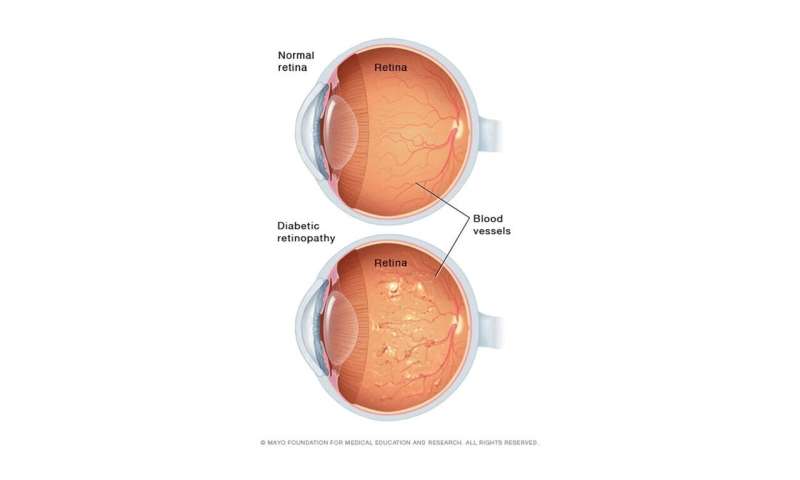
In a new study, investigators found that ideal cardiovascular health, which is indicative of a healthy lifestyle, was associated with lower odds for ocular diseases especially diabetic retinopathy. These findings appearing in the American Journal of Medicine, published by Elsevier, suggest that interventions to prevent cardiovascular diseases may also hold promise in preventing ocular diseases.
Globally, about 2.2 billion people suffer from ocular diseases leading to vision impairment or blindness. Approximately half of these cases could have been prevented. The leading causes of vision impairment or blindness are age-related macular degeneration, diabetic retinopathy, cataract, and glaucoma.
“Earlier studies have observed associations between eye diseases and individual lifestyle factors such as smoking, obesity, or hypertension,” explained lead investigator Duke Appiah, Ph.D., MPH, Department of Public Health, Texas Tech University Health Sciences Center, Lubbock, TX, USA. “It is known that these metrics of ideal cardiovascular health do not work alone and may interact additively to result in diseases. However, prior to our research, no other studies have comprehensively evaluated the association of all of the metrics of ideal cardiovascular health with ocular diseases.”
Most ocular diseases show few symptoms at early stages and many people may not seek medical care despite readily available treatments. A recent online nationwide survey consisting of all racial and ethnic groups in the United States conducted by the Wilmer Eye Institute at Johns Hopkins University School of Medicine showed that 88 percent of the 2,044 respondents considered good vision to be vital to overall health with 47 percent of them rating losing their vision as the worst disease that could ever happen to them. Alarmingly, 25 percent did not have any knowledge about ocular diseases and their risk factors.
This research shows that following healthy lifestyle and behavior habits can all contribute to good cardiovascular health as assessed by adherence to the American Heart Association’s prescription for health metric known as Life’s Simple Seven (LS7). LS7 is based on the status of seven cardiovascular disease risk factors: not smoking, regular physical activity, healthy diet, maintaining normal weight, and controlling cholesterol, blood pressure, and blood glucose levels.
Practicing these healthy lifestyles together was found to be associated with lower odds for age-related macular degeneration, diabetic retinopathy, cataract, and glaucoma. Individuals with optimal cardiovascular health had 97 percent lower odds for diabetic retinopathy compared to individuals with inadequate cardiovascular health.
Investigators evaluated data from 6,118 adults aged 40 or more years old who took part in the 2005-2008 National Health and Nutrition Examination Survey. The average age of participants was 57 years old, 53 percent of whom were women. A one unit increase in LS7 scores was associated with reduced odds for age-related macular degeneration, diabetic retinopathy, and glaucoma.
“Overall, we believe that primary prevention and early detection approaches of ocular diseases are important, considering that over half of all deaths from ocular diseases and cardiovascular diseases are known to be preventable,” commented co-investigators Noah De La Cruz, MPH, and Obadeh Shabaneh, MPH, both from the Department of Public Health, Texas Tech University Health Sciences Center, Lubbock, TX, USA.
Since there is a significant overlap of the risk factors for ocular diseases and cardiovascular disease, the investigators recommended that screening for ocular diseases be incorporated into existing clinical and population-based screenings for cardiovascular diseases.
Source: Read Full Article
